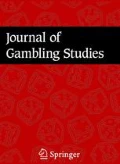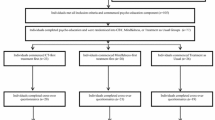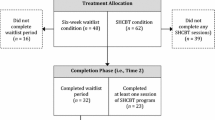Abstract
Pathological gambling is a developmental disorder usually associated with a continuous loss of control over gambling; it also involves a preoccupation with gambling and with obtaining money for the same purpose of gambling, irrational thinking, and a continuation of the behaviour despite being aware of its adverse consequences. This study examined the effectiveness of group cognitive-behavioural therapy (GCBT) on pathological gambling among Nigerian students. The study used a group randomised controlled trial design to assign participants to intervention and control groups. A total of 40 undergraduate students, aged 18–30, were classified as pathological gamblers (participants) in this study. Participants completed self-report scales titled South oaks gambling screen and Gambling Symptom Assessment Scale at three-time points. The intervention lasted for 8 weeks. The data collected were statistically analysed using repeated-measures ANOVA. Results revealed that GCBT has a significant effect in decreasing the symptoms of pathological gambling among the participants in GCBT compared to those in the control group and that the improvements were maintained at follow-up. The study concluded that group cognitive-behavioural therapy is impactful therapy in reducing pathological gambling among students. It has also validated the effectiveness of cognitive-behavioural therapy in altering erroneous thoughts and replacing it with a better alternative realistic way of thinking.
Similar content being viewed by others
References
Abayomi, O., Adebayo, K. O., Adelufosi, A. O., Ibrahim, N. O., Mosanya, J. T., Suleiman, B. T., et al. (2016). Risky substance use among patrons of gambling venues in Ogbomoso, Oyo State, Nigeria. International Journal of Research in Applied Natural and Social Sciences (IMPACT: IJRANSS), 4(1), 45–52.
Adebayo, D. O., Udegbe, I. B., & Sunmola, A. M. (2006). Gender, internet use, and sexual behavior orientation among young Nigerians. Cyberpsychology & Behavior, 9(6), 742–752.
Ahaibwe, G., Lakuma, C. P., Katunze, M., & Mawejje, J. (2016). Socio economic effects of gambling: Evidence from Kampala City, Uganda. Research Series, 126, 1–29.
Amandine, L., Ruben, M., Amine, B., Arnaud, C., & Henri-Jean, A. (2018). Cognitive training: A new avenue in gambling disorder management? Neuroscience and Biobehavioral Reviews. https://doi.org/10.1016/j.neubiorev.2018.10.011.
American Psychiatric Association. (2011). Diagnostic and statistical manual of mental disorders: DSM-5. Washington, D.C: American Psychiatric Association.
American Psychiatric Association. (2013). Diagnostic and statistical manual of mental disorders: DSM-5. Washington, D.C: American Psychiatric Association.
Beck, A. T. (1967). Depression: Causes and treatment. Philadelphia: University of Pennsylvania Press.
Binde, P. (2005). Gambling across cultures: Mapping worldwide occurrence and learning from ethnographic comparison. International Gambling Studies, 5(1), 1–27.
Bouchard, S., Robillard, G., Giroux, I., Jacques, C., Loranger, C., St-Pierre, M., et al. (2017). Using virtual reality in the treatment of gambling disorder: The development of a new tool for cognitive behavior therapy. Frontiers in Psychiatry, 8, 27. https://doi.org/10.3389/fpsyt.2017.00027.
Brooks, S. J., Lochner, C., Shoptaw, S., & Stein, D. J. (2017). Using the research domain criteria (RDoC) to conceptualize impulsivity and compulsivity in relation to addiction. Progress in Brain Research, 235, 177–218.
Choi, S. W., Shin, Y. C., Kim, D. J., Choi, J. S., Kim, S., Kim, S. H., et al. (2017). Treatment modalities for patients with gambling disorder. Annals of General Psychiatry, 16, 23.
Choi, S. W., Shin, Y. C., Youn, H., et al. (2016). Pharmacotherapy and group cognitive behavioral therapy enhance follow-up treatment duration in gambling disorder patients. Annals of General Psychiatry, 15(1), 20.
Cowlishaw, S., Merkouris, S., Dowling, N., Anderson, C., Jackson, A., & Thomas, S. (2012). Psychological therapies for pathological and problem gambling. Cochrane Database of Systematic Reviews. https://doi.org/10.1002/14651858.CD008937.pub2.
DeRubeis, R. J., Tang, T. Z., & Beck, A. T. (2001). Cognitive therapy. In K. S. Dobson (Ed.), Handbook of cognitive-behavioral therapies (2nd ed., pp. 349–392). New York: Guilford.
Du, Y.-S., Jiang, W., & Vance, A. (2010). Longer term effect of randomized, controlled group cognitive behavioural therapy for Internet addiction in adolescent students in Shanghai. Australian and New Zealand Journal of Psychiatry, 44, 129–134.
Ede, M. O., Anyanwu, J. I., Onuigbo, L. N., Ifelunni, C. O., Alabi-Oparaocha, F. C., Okenyi, E. C., et al. (2020). Rational emotive family health therapy for reducing parenting stress in families of children with autism spectrum disorders: A group randomized control study. Journal of Rational-Emotive & Cognitive-Behavior Therapy, 38, 243–271.
Ede, M. O., Igbo, J. N., Eseadi, C., Ede, K. R., Ezegbe, B. N., Ede, A. O., et al. (2019). Effect of group cognitive behavioural therapy on depressive symptoms in a sample of college adolescents in Nigeria. Journal of Rational-Emotive and Cognitive-Behavior Therapy. https://doi.org/10.1007/s10942-019-00327-1.
Egbochuku, E. O., & Aihie, N. O. (2009). Peer group counselling and school influence on adolescents' self-concept. Journal of Instructional Psychology, 36b(1), 3342–3377.
Ellis, A. (1962). Reason and emotion in psychotherapy. New York: Lyle Stuart.
Ezegbe, B. N., Eseadi, C., Ede, M. O., Igbo, J. N., Anyanwu, J. I., Ede, K. R., et al. (2019). Impacts of cognitive-behavioral intervention on anxiety and depression among social science education students: A randomized controlled trial. Medicine, 98(15), e14935.
Field, A., Miles, J., & Field, Z. (2012). Discovering statistics using R. New York: SAGE Publications.
Fink, A., Parhami, I., Rosenthal, R. J., Campos, M. D., Siani, A., & Fong, T. W. (2012). How transparent is behavioral intervention research on pathological gambling and other gambling-related disorders? A systematic literature review. Addiction, 107(11), 1915–1928.
Fong, T. W., & Rosenthal, R. J. (2008). Freedom from problem gambling. UCLA Gambling Studies Program & California Office of Problem and Pathological Gambling.
Freeman, A. (1987). Cognitive therapy: An overview. In A. Freeman & V. Greenwood (Eds.), Cognitive therapy: Applications in psychiatric and medical settings (pp. 19–35). New York: Human Science Press.
Gbadebo, J. (2017). Lawyer to FG: Take action against underage involvement in betting. The Nation. https://thenationonlineng.net/lawyer-to-fgtake-action-against-underage-involvement-in-betting/.
Hall, A. S., & Parsons, J. (2001). Internet addiction: College student case study using best practices in cognitive behavior therapy. Journal of Mental Health Counselling, 23, 312–327.
Igwe, E. U. (2013). Effect of individual and group counselling on secondary school students’ truant behaviour in Abia State. An International Multidisciplinary Journal, Ethiopia, 7(2), 277–293.
Karami, S., Ghasemzadeh, A., Saadat, M., Mazaheri, E., & Zandipour, T. (2012). Effects of group counseling with cognitive-behavioral approach on reducing divorce children depression. Procedia Social and Behavioral Sciences, 46, 77–81.
Kim, J. U. (2008). The effect of a R/T group counseling program on the internet addiction level and self-esteem of internet addiction university students. International Journal of Reality Therapy, 27(2), 4–12.
Kim, S. W., & Grant, J. E. (2001). An open naltrexone treatment study in pathological gambling disorder. International Clinical Psychopharmacology, 16, 285–289.
Kim, S. W., Grant, J. E., Potenza, M. N., Blanco, C., & Hollander, E. (2009). The gambling symptom assessment scale (G-SAS): A reliability and validity study. Psychiatry Research, 116(1), 76–84.
Kuru, E., Özdemir, İ., Şafak, Y., Tulacı, R. G., & Türkçapare, M. H. (2017). Cognitive behavioural therapy with pharmacotherapy for pathological gambling patient: Case report. Psychiatry and Clinical Psychopharmacology. https://doi.org/10.1080/24750573.2017.1338820İ.
Ladouceur, R., Boisvert, J. M., & Dumont, J. (1994). Cognitive-behavioural treatment for adolescents pathological gamblers. Behaviour Modification, 18, 230–242.
Ladouceur, R., Sylvain, C., Boutin, C., Lachance, S., Doucet, C., Leblond, J., & Jacques, C. (2001). Cognitive treatment of pathological gambling. Journal of Nervous and Mental Disease, 189(11), 774–780.
Ladouceur, R., Sylvain, C., Letarte, H., Giroux, I., & Jacques, C. (1998). Cognitive treatment of pathological gamblers. Behaviour Research and Therapy, 36(12), 1111–1119.
Lakens, D. (2013). Calculating and reporting effect sizes to facilitate cumulative science: A practical primer for t-tests and ANOVAs. Frontiers in Psychology, 4, 863. https://doi.org/10.3389/fpsyg.2013.00863.
Lesieur, H. R., & Blume, S. B. (1987). The South Oaks Gambling Screen (SOGS): A new instrument for the identification of pathological gamblers. American Journal of Psychiatry, 144, 1184–1188.
Moghaddam, J. F., Yoon, G., Dickerson, D. L., Kim, S. W., & Westemeyer, J. (2015). Suicidal ideation and suicide attempts in five groups with different severities of gambling: Findings from the national epidemiologic survey on alcohol and related conditions. American Journal Addiction, 24, 292–298.
Ncheke, D. C. (2016). Effect of group counselling on enhancing school adjustment of social isolates among secondary school students. The Educational Psychologists, 10(1), 54–58.
Nigeria Communications Week. (2017). New poll reveals rising trend of gambling, betting in Nigeria. Retrieved from https://nigeriacommunicationsweek.com.ng/new-poll-reveals-rising-trend-of-gambling-betting-in-nigeria/.
Okorodudu, P. (2014). Why youths are addicted to gambling. Retrieved from https://thenationonlineng.net/why-youths-are-addicted-to-gambling/.
Okwaraji, F. E., Aguwa, E. N., Onyebueke, G. C., Arinze-Onyia, S. U., & Shiweobi-Eze, C. (2015). Gender, age and class in school differences in internet addiction and psychological distress among adolescents in a Nigerian Urban city. International Neuropsychiatric Disease Journal, 4(3), 123–131.
Onwuagboke, B. B. C., Singh, T. K. R., Fook, F. S. F., & Onwuagboke, J. N. (2014). Internet use among faculty members of colleges of education in South eastern Nigeria. European Scientific Journal, 10(31), 88–102.
Rash, C. J., Weinstock, J., & Patten, R. V. (2016). A review of gambling disorder and substance use disorders. Substance Abuse and Rehabilitation, 7, 3–13.
Reed, G. M., et al. (2018). The ICD-11 developmental field study of reliability of diagnoses ofhigh-burden mental disorders: Results among adult patients in mental health settings of 13 countries. World Psychiatry, 17, 174–186.
Saghaei, M. (2004). Random allocation software [Computer software]. Retrieved from https://mahmoodsaghaei.tripod.com/Softwares/randalloc.html.
Sylvain, C., Ladouceur, R., & Boisvert, J. M. (1997). Cognitive and behavioral treatment of pathological gambling: A controlled study. Journal of Consulting and Clinical Psychology, 65, 727–732.
Tanabe, J., Thompson, L., Claus, E., Dalwani, M., Hutchison, K., & Banich, M. T. (2007). Prefrontal cortex activity is reduced in gambling and nongambling substance users during decision-making. Human Brain Mapping, 28(12), 1276–1286.
Teetersa, J. B., Ginleya, M. K., Whelana, J. P., Meyersa, A. W., & Pearlsonb, G. D. (2015). The moderating effect of gender on the relation between expectancies and gambling frequency among college students. Journal of Gambling Studies, 31(1), 173–182.
Tomei, A., Besson, J., & Grivel, J. (2017). Linking empathy to visuospatial perspective-taking in gambling addiction. Psychiatry Research, 250, 177–184. https://doi.org/10.1016/j.psychres.2016.12.061.
Verbeke, E., & Dittrick-Nathan, K. (2007). Student gambling. Principal leadership (High School Ed.), 8(2), 12–15. Retrieved from Education Full Text database.
Weinstock, J., Rash, C. J., & Burton, S. (2013). Examination of proposed DSM-5 changes to pathological gambling in a helpline sample. Journal of Clinical Psychology, 69(12), 1305–1314.
World Health Organization. (2018). International classification of diseases, 11th ed. Retrieved from https://icd.who.int/browse11/l-m/en#/http://id.who.int/icd/entity/1448597234.
Wulfert, E., Blanchard, E. B., Freidenberg, B. M., & Martell, R. S. (2006). Retaining pathological gamblers in cognitive behavior therapy through motivational enhancement: A pilot study. Behavior Modification, 30(3), 315–340. https://doi.org/10.1177/0145445503262578.
Acknowledgements
The researchers’ inestimable gratitude goes to Dr. J. U. Eze, Dr. J. I. Anyanwu, and Prof. I.C.S Ifelunni for their wonderful roles in the course of the study. We also appreciate our research assistants and participants for their commitments during the research.
Funding
We declare that no institution or organization funded this paper.
Author information
Authors and Affiliations
Corresponding authors
Ethics declarations
Conflict of interest
There is no potential financially or non-financially, directly or indirectly conflicts of interest related to the study.
Additional information
Publisher's Note
Springer Nature remains neutral with regard to jurisdictional claims in published maps and institutional affiliations.
Rights and permissions
About this article
Cite this article
Ede, M.O., Omeje, J.C., Ncheke, D.C. et al. Assessment of the Effectiveness of Group Cognitive Behavioural Therapy in Reducing Pathological Gambling. J Gambl Stud 36, 1325–1339 (2020). https://doi.org/10.1007/s10899-020-09981-y
Accepted:
Published:
Issue Date:
DOI: https://doi.org/10.1007/s10899-020-09981-y




